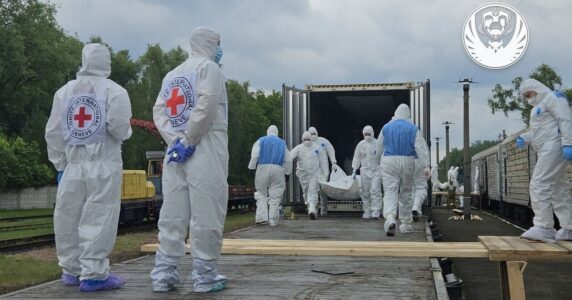Navigation and useful materials
On Sunday, April 3, the pro-government Fidesz party won the parliamentary elections in Hungary by a wide margin. This is the fifth in general and fourth in a row victory of incumbent Hungarian Prime Minister Viktor Orbán, who will remain in office.
The relations between Ukraine and Hungary could not be labeled as the warmest. Since the beginning of the war, official Budapest, on the one hand, has been condemning Russia’s aggression and receiving Ukrainian refugees and, on the other hand, has been blocking initiatives that are painful for the Kremlin. And the Ukrainian and Hungarian foreign ministries regularly exchange sharp statements.
We explain what strengthening Viktor Orban’s position in Hungary means for Ukraine.
Hungary’s position on the war in Ukraine
Official Budapest condemns the Russian invasion in Ukraine, but immediately adds that it will not allow Hungary to be drawn into the war. The Hungarians refused to sell and hand weapons to Ukraine, and also did not allow the transit of the weapons from the allies through their territory.
The Hungarian Foreign Minister Peter Siarto strongly opposed the closed skies over Ukraine and the introduction of a peacekeeping mission in Ukraine. According to him, this could lead to the involvement of NATO and Hungary in particular into the conflict.
The position of the Hungarian government is unlikely to change dramatically after the election, as Budapest is heavily hooked on Russia’s energy needle: from cheap gas to oil and nuclear energy.
Tighter embrace of Budapest and Moscow
Back in early March, Hungarian Prime Minister Viktor Orban said his country would not support an embargo on Russian energy resources. According to him, the Hungarian economy will simply stop without Russian energy resources. Ordinary Hungarians will also suffer, 90% of whom heat their homes with Russian gas.
The share of gas in Hungary’s energy balance is about 40%. And all of this gas is Russian. Dependence on Russian oil is slightly lower but still high – more than ⅔ of all imports. Even before the election, Orban was not ready to sacrifice Russian energy resources, and now, after a landslide victory, even more. Moreover, cooperation between the Kremlin and Budapest can only intensify. Isolated Russia urgently needs to show that not the whole world is against it.
Spokes in a wheel on the way to EU and NATO
Three weeks before the Russian invasion, it became known that Hungary blocked Ukraine’s accession to the NATO cyber center. And it did so in the context of numerous cyber attacks on Ukrainian infrastructure by Russian hackers. Earlier, Budapest promised to block Ukraine’s Euro-Atlantic aspirations after the adoption of the law “On Education” in 2017, in which our neighbors did not like the language norm.
What can we expect now, after Viktor Orban stated that he had to compete in the election not only against his opponents but also against the Ukrainian president? It is already known that Hungary is one of the opponents of Ukraine’s rapid movement towards EU membership. And Victor Orban can play this card to the fullest. It can be the same with the possible integration with NATO, where all decisions are made by consensus.
Threat to the unity of the EU’s position
Hungary is perhaps the only EU country to say that sanctions against Russia will not have the desired effect to end the war and will hit the European Union hard. This statement was made in early March by the head of the administration of the Prime Minister of Hungary, Georgy Guyas. This kind of attitude, together with the refusal to provide assistance to Ukraine, has already provoked criticism in neighboring Poland and the Czech Republic.
Another dividing line could be the gas issue, where Budapest is completely dependent on Moscow. Russia wants to convert gas contracts into rubles. The Baltic states reacted categorically to such blackmail – they completely refused to import Russian natural gas. Other EU countries are uniform in their position on the dollar or euro payments as agreed in long-term contracts. There is an illustrative example of Slovakia, where the economy minister allowed the possibility of a ruble payment, but the country’s prime minister later said that Bratislava would act in unison with the EU.
What about Budapest? No official position on this vital issue for Hungary. This means that either Putin’s demand does not apply to his friends in Europe, or a blow to the unity of the EU position should be expected from Budapest.
Money for Ukrainian refugees
More than half a million of Ukrainians have left for Europe across the Hungarian border. More left in Poland alone – more than 2 million people. The Hungarian government is seeking funding from the EU to accommodate and provide for Ukrainian refugees. But there was a problem with counting.
Official Budapest insists Hungary has accepted more than 540,000 Ukrainians fleeing war as of end-March. The Hungarian Helsinki Committee says the figure is significantly inflated, as Hungary is a transit country for many Ukrainians. During the month of the war, 80,000 Ukrainians applied for protected status. Therefore, Hungary’s behaviour in trying to obtain additional funds from the EU raises at least one question: what will happen if Europe does not fully comply with Budapest’s request?
The leitmotif of Hungary’s current policy is the phrase “this is not our war.” But in Budapest, they must remember that their borders are inviolable only because the Ukrainian army stops the aggressor on their land. And that the plants may stop not because of the blocked gas supply, but because they were bombed. And the fact that it’s cold in the houses is not so bad, because at least they are not bombed.
Russia’s economic preferences for Hungary are nothing more than a manifestation of the old imperial principle of “divide and rule.” Budapest should understand that it is convenient and safe to love Russia only at a safe distance. Because Hungary knows well what Russia’s deadly embrace is. And he is unlikely to want to repeat the 1956 experience.
If you have found a spelling error, please, notify us by selecting that text and pressing Ctrl+Enter.


